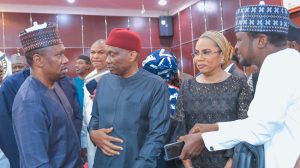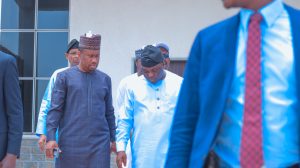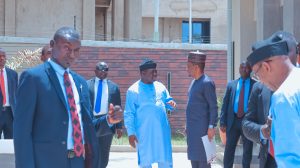News
Controversy Trails Leaked List Of Terrorists’ Financiers
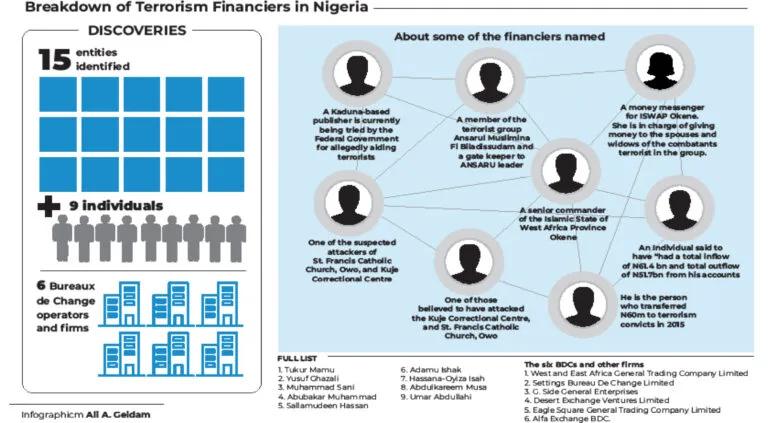
There is controversy around the list of terror financiers purportedly leaked by the Nigerian Financial Intelligence Unit (NFIU) and reported on Wednesday, March 20, 2024.
Daily Trust reports that for nearly fifteen years, the federal government, right from the administration of former President Goodluck Jonathan, his successor, Muhammadu Buhari, and recently that of Bola Tinubu, have promised to expose terror financiers in the country with a view to unravelling the mystery surrounding the menace.
Thousands of people have been killed since 2009 when the Boko Haram crisis erupted; and the orgy of violence escalated with the onset of banditry in the North West and parts of North Central, as well as sundry crimes manifesting in different forms in other parts of the country.
A report by the Punch newspaper on Wednesday, said the federal government had uncovered the identity of 15 entities, including nine individuals and six Bureaus De Change allegedly involved in terrorism financing.
It said details of the development were revealed by the NFIU, in an email sent on Tuesday night, entitled “Designation of Individuals and Entities for March 18, 2024.”
It indicated that the document revealed that the Nigeria Sanctions Committee met on March 18, 2024, where specific individuals and entities were recommended for sanction following their involvement in terrorism financing.
“The Honourable Attorney General of the Federation, with the approval of the President, has thereupon designated the following individuals and entities to be listed on the Nigeria Sanctions List,” the document read in part.
Even though the first story clearly mentioned the Kaduna-based publisher, Tukur Mamu, who is currently being tried by the federal government for allegedly aiding the terrorists who attacked the Abuja-Kaduna train in March 2022, an updated story, which has gone viral on multiple platforms, listed other names and entities.
These include: Yusuf Ghazali, Muhammad Sani, Abubakar Muhammad, Sallamudeen Hassan, Adamu Ishak, Hassana-Oyiza Isah, Abdulkareem Musa, and Umar Abdullahi.
It also listed six BDCs and firms including the West and East Africa General Trading Company Limited, Settings Bureau De Change Limited, G. Side General Enterprises, Desert Exchange Ventures Limited, Eagle Square General Trading Company Limited and Alfa Exchange BDC.
Apart from Mamu, all the remaining names mentioned are not known, and efforts to unravel their identities did not yield any result as of press time.
NFIU disowns memo
Contacted yesterday to give more insight on the development, the Head of Public Affairs, NFIU, Abubakar Abba Ibrahim, said the organisation did not issue any statement.
Another senior official in the agency, Sani Tukur, said on the media WhatsApp platform of the agency, “There was no statement from our office sir. I have asked around and no one seems to know how they got it. I believe it is being investigated.”
Also contacted to know when the trial of the suspects will commence, a senior official in the office of the Attorney General of the Federation and Minister of Justice, Lateef Fagbemi, said they read the story.
“We saw nothing to expand on it because it is not new,” the source said.
The source further disclosed that the BDC operators and Tukur Mamu have been in court since their indictment in Dubai and arrest in Egypt, respectively.
Arrests started since 2020
Daily Trust had reported in April 2021, that dozens of persons have been arrested by security agents in an on-going nationwide crackdown on suspected financiers and collaborators of Boko Haram and other criminal groups in Nigeria.
Five months earlier, this newspaper had exclusively reported the jailing of six Nigerians in the United Arab Emirates (UAE) over allegations of terrorism financing.
It was gathered that the closely-guarded operation was being coordinated by the Defence Intelligence Agency (DIA), in collaboration with the Department of State Services (DSS), NFIU and the Central Bank of Nigeria (CBN).
As part of the operation, billions of naira traced to businesses belonging to persons of interest had been blocked in banks in a series of “post no debit” letters sent out to banks by the CBN and NFIU. The apex bank also obtained court orders directing freezing of dozens of accounts flagged for suspicious transactions.
A security source familiar with the operation confided in a national daily at the time that the operation started in 2020 with massive gathering and analysis of financial intelligence and drawing uplink analysis, leading to initial marking of some 60 businesses and individuals.
The source said an initial list of 957 suspects comprising bureau de change operators, gold miners and sellers, and other businessmen, was being acted upon.
Before the crackdown was relaxed, about 400 persons were arrested in a series of arrests in Kano, Borno, Abuja, Lagos, Sokoto, Adamawa, Kaduna and Zamfara.
Recent leaked findings
In the latest leaked document, it was stated that Mamu “Participated in the financing of terrorism by receiving and delivering ransom payments over the sum of $200,000 US in support of ISWAP terrorists for the release of hostages of the Abuja-Kaduna train attack.”
The document said one of the individuals is “The suspected attacker of the St. Francis Catholic Church, Owo, Ondo State on June 5, 2022 and the Kuje Correctional Centre, Abuja on July 5, 2022.”
Another was described as “A member of the terrorist group, Ansarul Muslimina Fi Biladissudam, the group is associated with Al-Qaeda in the Islamic Maghreb.
“The subject was trained and served under Muktar Belmokhtar, aka One Eyed Out, led Al-Murabitoun Katibat of AQIM in Algeria and Mali.”
The NFIU allegedly said the individual “Specialises in designing terrorist clandestine communication code and he is also an Improvised Explosive Device expert.
“The subject was also a gatekeeper to ANSARU leader, Mohammed Usman aka Khalid Al-Barnawi. Equally, he was a courier and travel guide to AQIM Katibat in the desert of Algeria and Mali. He is into carpentry. Subject fled Kuje Correctional Centre on July 5, 2022. He is currently at large.”
Another was identified as “A senior commander of the Islamic State of West Africa Province Okene.”
It said the individual “Came into limelight in 2012, as North Central wing of Boko Haram.
“The group is suspected of the attacks carried out around Federal Capital Territory and the South West Geographical Zone, including the June 5, 2022 attack on St. Francis Catholic Church, Owo, Ondo State.”
Another was described as “A financial courier to ISWAP Okene. She is responsible for the disbursement of funds to the widows/wives of the terrorist fighters of the group.”
According to the document, another of the individuals “In 2015, transferred N60 million to terrorism convicts”, and was said to have “Received a sum of N189 million between 2016 and 2018.”
The same person was said to “Own entities and business reported in the UAE court judgment as facilitating the transfer of terrorist funds from Dubai to Nigeria.”
Another individual was said to have “Received a total of N57 million from between 2014 and 2017.”
Another was said to have “Had a total inflow of N61.4 billion and a total outflow of N51.7 billion from his accounts.”
4 of 6 indicted BDCs not registered with CAC
Findings by Daily Trust revealed that four of the six bureaus de change allegedly named by the federal government as terrorism financiers are either not registered or have been delisted by the Corporate Affairs Commission (CAC).
Out of the six BDCs, only two, namely Desert Exchange Ventures Limited and Settings Bureau De Change were seen as registered with CAC although their statuses are inactive.
Subsequently, no results were found for West and East Africa General Trading Company Limited, G. Side General Enterprises, Eagle Square General Trading Company Limited and Alfa Exchange BDC.
This means they were either delisted by the CAC or have not been registered at all.
Desert Exchange Ventures Limited is located at NO. 18, M. Y. C. House, Lawan Dambazau Road, Kano and was incorporated on May 7, 2015, while Settings Bureau De Change is located at NO.43 Ibrahim Taiwo Rd, Kano, and was Incorporated on April 9 2014.
News
Governor Kefas Inaugurates Taraba State Investment International Summit Committee+Photos
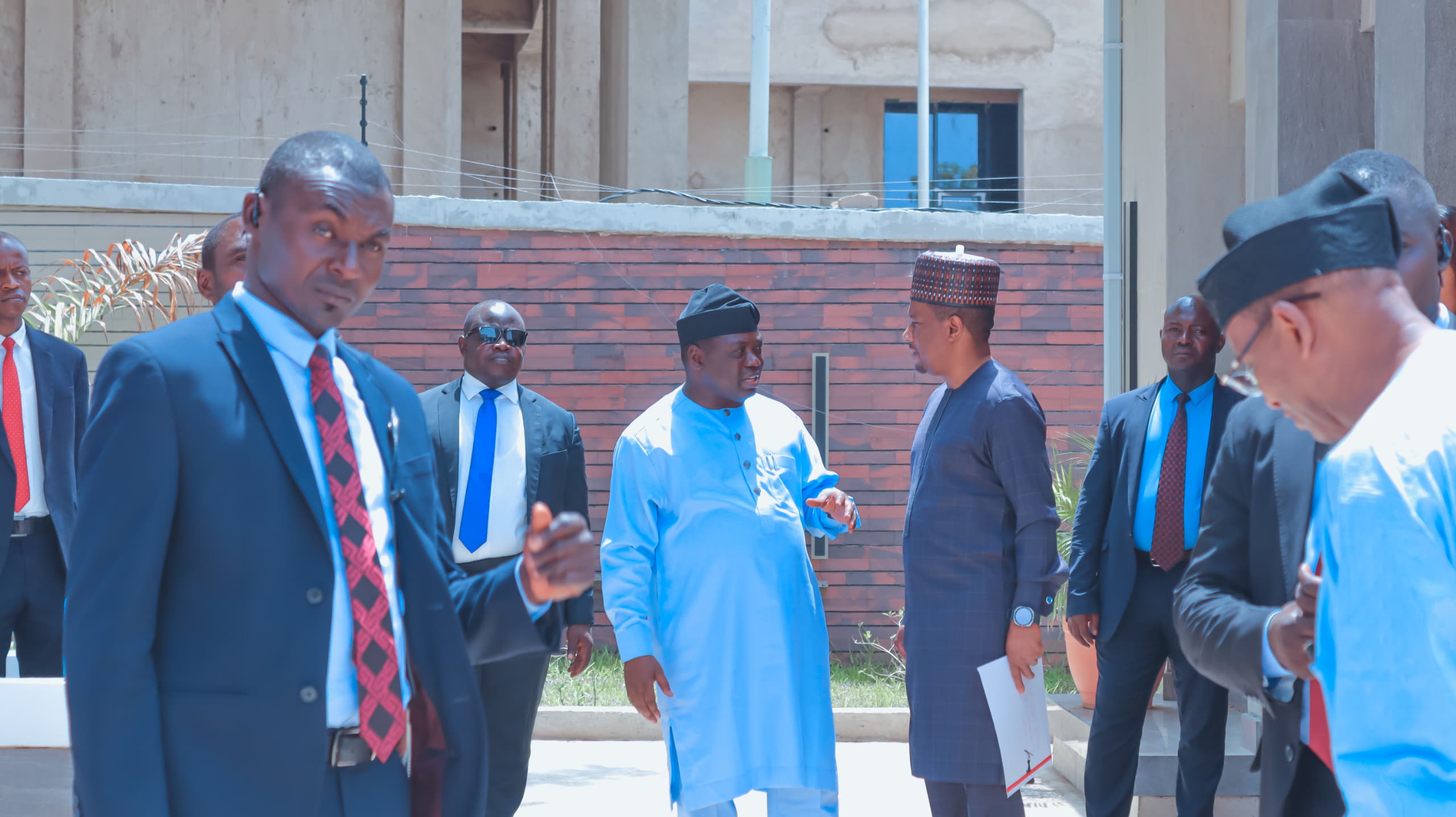
In a significant step towards enhancing investment opportunities in Taraba State, Governor Dr. Agbu Kefas on Saturday inaugurated the Committee for the International Investment Summit at the Executive Chamber of the Government House in Jalingo.
Senator Manu Haruna, former deputy governor of Taraba State and a serving Senator, a seasoned administrator who chairs Taraba State Mobilization and development Investment Committee expressed gratitude to Governor Kefas for his visionary leadership in organizing an international summit aimed at attracting investment to the state.
He highlighted the potential this initiative holds for fostering economic growth and development in Taraba State.
Rt. Hon. Ndudi Elumedu the Chairman of the Taraba State International Investment Summit Committee, emphasized that such summits are crucial for stimulating economic activities and creating opportunities..
According to him, the summit will play a vital role in showcasing Taraba’s investment potential, thereby attracting both local and international investors.
The committee is expected to work diligently to prepare for the summit, ensuring that it positions Taraba State as a favorable destination for investment and economic collaboration.
Governor Kefas remains committed to promoting policies that support economic diversification and sustainable 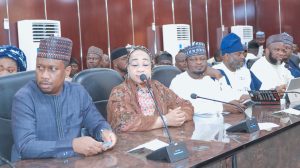
This inauguration marks a positive development in Taraba’s ongoing efforts to enhance its economic landscape and improve the standard of living for its residents.
News
OERAF Rounds Up Late Chief Ekuogbe Rowland Akpodiete’s remembrance with Novelty Match

By Kennedy Atevure
Olotu & Ekuogbe Rowland Akpodiete Foundation (OERAF) rounded up the remembrance of late Chief Ekuogbe Rowland Akpodiete, Ph.D., with a novelty match at Ughelli Public Field on April 11, 2025.
Speaking shortly after the match, Dr. Olotu Otemu Akpodiete appealed to the Ughelli North Local Government Council Vice Chairman’s representative for the council to upgrade the field to a mini stadium.
Dr. Akpodiete stressed that Ughelli Public Field has been in existence since before the state government built the Ughelli Township Stadium.
The novelty match, which ended in a 1-1 draw, thrilled everyone who watched it.
The team of the children of late Chief Ekuogbe Rowland Akpodiete, Ph.D., scored the first goal, which was equalized by the grandchildren’s team through a penalty kick.
Dignitaries present during the novelty match included Hon. Chief (Mrs.) Meg Atano, Ughelli North Local Government Council Vice Chairman, ably represented by Pst. (Mrs.) Rita Nyewhoema; Evang. Nicolas Evwienure; Mrs Efe Akpodiete -Minabowan Barr. Agboka Akpodiete-Omale; Hon . Felix Uloho, Chief Grace Akpodiete; and Mr. Kennedy Otega (Big Daddy), among others.
Other highlights of the event included the presentation of cash prizes to both teams and a group photograph with light refreshments.
News
Senate President moves to build capacity for Senate Clerk, other officials for efficient performance

In a deliberate bid to build capacity for the Senate Clerk and other officials of clerks-at-the-table, the Senate President, Godswill Akpabio has encouraged refresher courses for such officials to bolster their performance levels for efficiency and effectiveness.
The first to benefit from the initiative was the Clerk of the Senate, Mr Andrew Nwoba, who just rounded off his one-month refresher course on Thursday, April 10, 2025 and is due to resume at his desk in plenary when they reconvene, 29th April, 2025.
This positive development is contrary to media reports on Thursday, April 10, 2025, insinuating that the Senate President passed a vote of no confidence in Mr Nwoba’s capacity to properly guide the upper legislative chamber during the sittings.
An official of the National Assembly said that the President of the Senate, in his leadership consideration, magnanimity and support for top officials of the Senate and other staff members, approved a refresher course for the Clerk Senate, Andrew Nwoba.
The approval was to free him from his responsibilities in the chamber for a month. The Deputy Clerk (legislative) acted in his absence.
Reports said that having served creditably as Clerk of National Population and Gas committees, Secretary, Legislative Budget and currently, Clerk Senate, Mr Nwoba has garnered requisite experience to proactively guide and advise on adherence and compliance with the Standing Rules of the Senate.
Besides, staff members agree that Nwoba has efficiently and responsibly discharged his role as the Chief Accounting Officer of the Senate.
As Senate Clerk, Nwoba ensures smooth proceedings in line with procedural orders that are circumscribed in the Standing Rules of the Senate.
In addition to ensuring legislative due process through the eyes of the rules, he also discharges other administrative duties.
The Clerk Senate performs these overarching assignments with the assistance of two Deputy Senate Clerks, one in charge of legislative duties and the other in charge of administration.
An official explained that the refresher course could hold any time and would not disrupt the workings of the clerks-at-the-table since there are enough hands, particularly, Deputy Clerk (Legislative), to deploy in plenary to guide, direct and advise the presiding officer in his absence.
As learnt, Nwoba, has been doing this by allowing the Deputy Clerk (Legislative) to help guide, direct and advise the presiding officer, and the synergy has been adjudged to be “progressive and productive.”
Another official said in a chat that “It is most unfortunate, that some naysayers want to create bad blood between the President of the Senate and the Clerk of the Senate by making tenuous utterances and unfounded insinuations.
“The Clerk of Senate has been enjoying the support of the Senate President. He particularly received his unequivocal support during his elevation to the position by the National Assembly service Commission. The Clerk, in turn, has tremendous respect and regards for the President of the Senate, his leadership style, his listening ears, his simple nature, which are qualities that are rare in today’s political space.
“Out of his concern for the Senate Clerk, considering his zeal, determination, dedication and passion for the job, the Senate President respectfully asked him to go for a month refresher course to enhance top-notch performance and greater efficiency. This, for me, is the real vote of confidence in the Clerk Senate.”
-

 News22 hours ago
News22 hours agoConstituents Drag Akpabio, Senate to Court Over Suspension of Natasha
-
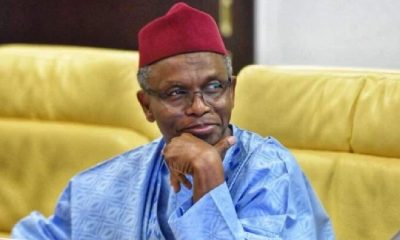
 News8 hours ago
News8 hours agoWe only had lunch with Buhari not 2027 politics -El-Rufai
-

 News21 hours ago
News21 hours agoFCT minister, Wike gives land allotees 21 days to pay or lose offer
-
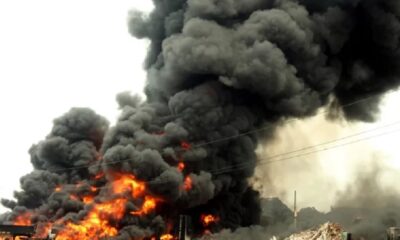
 News8 hours ago
News8 hours agoSad! Explosion rocks Lagos
-

 News8 hours ago
News8 hours agoParts of Abuja, Niger in total darkness -AEDC confirms
-
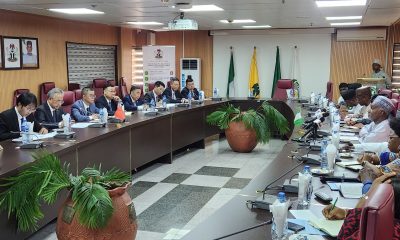
 News23 hours ago
News23 hours agoNigeria-China Reaffirms Commitment To Strategic Partnership
-
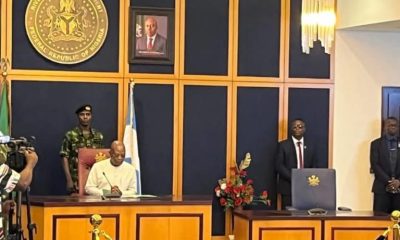
 News7 hours ago
News7 hours agoIbas gives reasons why Sole Administrators were appointed for Rivers councils
-
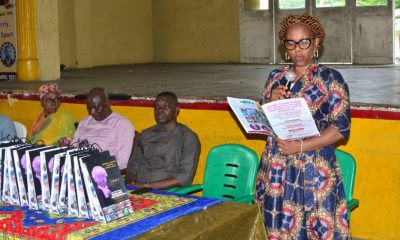
 News22 hours ago
News22 hours agoOERAF Holds Memorial Lecture on the Benefits of Debate Competitions for Students in Ughelli


